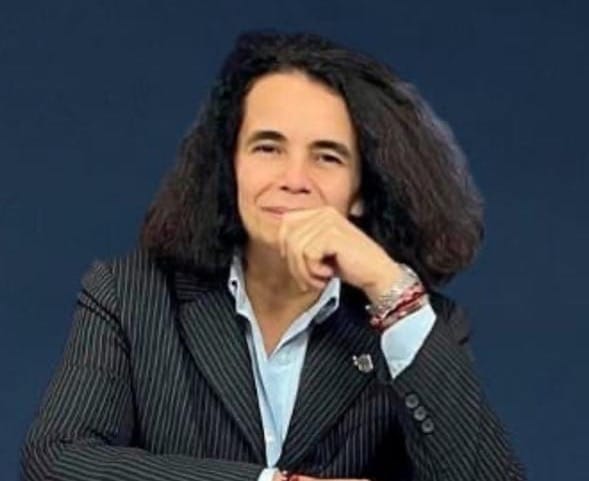Por Sofía Guadarrama Collado
La tómbola es una serie de relatos breves escritos exclusivamente para Opinión 51.
Desde hace varios meses Ella baila disfrazada con una botarga de una Sor Juana saliendo de un fajo de billetes afuera de una sucursal de Banteayuda, «el banco que sí te ayuda». Tiene programada una lista de canciones en su teléfono celular. La mayoría cumbias y uno que otro reguetón. La que nunca falta es La vida es una tómbola, con Marisol «Pepa Flores».
Las razones por las que comenzó a bailar dentro de la botarga se han difuminado. Ya perdió la esperanza de atrapar al hombre que la violó. Ya dejó de llorar. De un tiempo para acá, se pone su botarga y baila sin sentir odio ni deseos de matar al que la violentó una noche mientras ella caminaba en la calle. No es porque lo haya perdonado, sino porque las heridas sanan, aunque haya gente que no lo crea. Afortunadamente, la mente también sana. No siempre, pero sí la mayoría de las veces.
Baila y se pregunta si llorar tantas veces dentro de su botarga fue lo que le ayudó a sanar o fue el calor insoportable. Baila y ríe cuando los niños se acercan a abrazar a la Sor Juana. Incluso ella misma ha aprendido a jugar con la gente. Cuando alguien viene caminando hacia la sucursal Ella abre los brazos y camina para abrazarlos. La mayoría sonríe y le corresponde.
Cuando se cansa, se sienta en la banca de la parada de autobuses, donde la mayoría de las veces hay alguien esperando el siguiente camión.
—Tu trabajo debe ser muy divertido —le dice una mujer.
—A ver, métete tú en esa pinche botarga —le responde otra mujer en minifalda que también espera su camión.
—Estoy hablando con Sor Juana, no con las ficheras del congal.
—Teibolera, mamacita, y a mucha honra.
—Peor aún… —responde la mujer al mismo tiempo que se aleja de ella como si tuviera una enfermedad contagiosa.
Ella no responde. Escucha, como siempre. No le gusta platicar con la gente.
—A ver, Sor Juanita, platícale lo feliz que estás bailando dentro de tu botarga.
En ese momento se escucha el canto de una multitud:
Que tiemble el Estado, los cielos, las calles,
que teman los jueces y los judiciales.
Hoy a las mujeres nos quitan la calma,
nos sembraron miedo, nos crecieron alas.
—¡Ahí vienen las escandalosas! —se queja la mujer— Se me olvidó que hoy es 8 de marzo.
—¡Eso chingonas! —responde la otra.
—¿Además de teibolera eres feminazi?
—Feminista —la corrige.
—Eso del feminismo es lo opuesto del machismo.
—¿Eres mujer y no entiendes el feminismo?
—Sí lo entiendo. Mejor que tú. Yo sí estudié. Ya no hay necesidad de hacer estas marchas. Ya existe igualdad de género en la mayoría de los aspectos legales y laborales. Únicamente promueven discursos de odio hacia los hombres. Y lo peor de todo es que con su cultura woke, algunas mujeres reciben trato preferencial, lo que se convierte en desigualdad inversa hacia los hombres.
—Entre muchas otras cosas, el feminismo busca la equidad entre hombres y mujeres.
—Entonces deberían llamarlo «igualitarismo».
El canto de la multitud se escucha cada vez más fuerte.
A cada minuto de cada semana
nos roban amigas, nos matan hermanas,
destrozan sus cuerpos, las desaparecen.
No olviden sus nombres, por favor, señor presidente.
El piso vibra como si estuviera temblando. Ella se pone la cabeza de la botarga de Sor Juana y se aleja de la banca de la parada de autobús. Observa entusiasmada a la comitiva que avanza hacia el Zócalo. Nunca ha participado en una marcha feminista.
Por todas las compas marchando en Reforma,
por todas las morras peleando en Sonora,
por las comandantas luchando por Chiapas,
por todas las madres buscando en Tijuana,
cantamos sin miedo, pedimos justicia,
gritamos por cada desaparecida.
Que retumbe fuerte: ¡Nos queremos vivas!
¡Que caiga con fuerza el feminicida!
La comitiva llega frente a la sucursal de Banteayuda, «el banco que sí te ayuda» y Ella siente que el cuerpo se le enciende dentro de una enorme llama. ¿Será Sor Juana? Se le hace un nudo en la garganta al escuchar a todas esas mujeres cantar al unísono:
Yo todo lo incendio, yo todo lo rompo.
Si un día algún fulano te apaga los ojos,
ya nada me calla, ya todo me sobra,
si tocan a una, respondemos todas.
«¿Y si hubiera sido yo?», se pregunta. «A mí no me encontraron descuartizada en un terreno baldío». En ese momento, vuelve a ella el aterrador recuerdo de aquella noche en la que un hombre la secuestró, la violó e intentó matarla, pero Ella escapó.
Soy Claudia, soy Esther y soy Teresa.
Soy Ingrid, soy Fabiola y soy Valeria.
Soy la niña que subiste por la fuerza.
Soy la madre que ahora llora por sus muertas.
Y soy esta que te hará pagar las cuentas.
Ella no pudo hacer que aquel desgraciado pagara por lo que le hizo. Y por ello se llenó de odio. Un odio que poco a poco se ha diluido. Sabe que no debe vivir con ese odio.
¡Justicia! ¡Justicia! ¡Justicia! —gritan las miles de mujeres que marchan frente a Ella y de pronto, por primera vez siente que alguien está gritando por ella. No es una ni dos ni tres. Son miles de mujeres exigiendo justicia por lo que le hicieron a Ella. Y una vez más, llora dentro de su botarga, sólo que esta vez llora de alegría porque todas esas mujeres la están defendiendo.
Por todas las compas marchando en Reforma.
Por todas las morras peleando en Sonora.
Por las comandantas luchando por Chiapas.
Por todas las madres buscando en Tijuana.
Cantamos sin miedo, pedimos justicia.
Le tiemblan las manos y las piernas. Su corazón palpita de emoción. Mira la hora y sabe que falta mucho para su hora de salida, pero ya no puede contenerse y decide acompañar al contingente.




